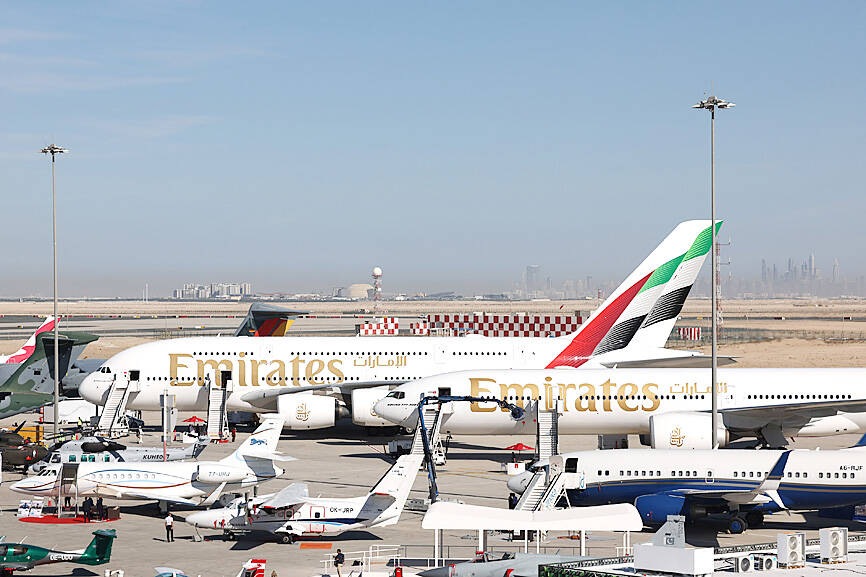The biennial Dubai Air Show opened yesterday with airlines poised to make major aircraft purchases after rebounding from the groundings of the COVID-19 pandemic, even as Israel’s war with Hamas clouds regional security.
That conflict, as well as Russia’s war on Ukraine, are likely to influence the five-day show at Al Maktoum International Airport at Dubai World Central. It is the city-state’s second airfield after Dubai International Airport, the world’s busiest for international travel and the home base for the long-haul carrier Emirates.
While commercial aviation takes much of the attention, arms manufacturers also have exhibitions at the show. Two major Israeli firms — Rafael Advanced Defense Systems Ltd and Israel Aerospace Industries Ltd (IAI) had been slated to participate.

Photo: Bloomberg
However, the IAI stand, bearing the slogan “Where Courage Meets Technology,” was roped off and empty yesterday morning as people poured into the show.
A stand for Rafael handed out coffee, although there were no salespeople. The company also sponsored a meeting of air force commanders yesterday at a luxury Dubai hotel, highlighting the balancing act being struck by the United Arab Emirates (UAE) amid anger in the Arab world over the Israel-Hamas war.
The UAE, a federation of seven sheikhdoms, established diplomatic relations with Israel in 2020.
The firm Russian Helicopters has staff on hand after attending the Abu Dhabi arms fair earlier this year, despite being sanctioned over Moscow’s invasion of Ukraine. ROSCOSMOS, the Russian state space company, is also at the show.
Global aviation is booming after the COVID-19 pandemic saw worldwide lockdowns and aircraft grounded, particularly at Al Maktoum Airport, which served for months as a parking lot for Emirates’ double-decker Airbus SE 380s.
Air traffic is now at 97 percent of pre-COVID-19 levels, the International Air Transport Association (IATA) said. Middle Eastern airlines, which fly key east-west routes, saw a 26.6 percent increase in September traffic compared with a year earlier, IATA said.
Boeing is closing in on a major order for its 777X wide-body model from Emirates, people familiar with the discussions said, in what would provide an important boost to a program that is years behind schedule.
Already the biggest buyer of the 777X, Emirates is poised to make a high double-digit order of the aircraft, it said. As part of the deal, regional affiliate FlyDubai could take some of Emirate’s 787 Dreamliner earmarked orders, the company said.
EgyptAir is also set to receive 18 Boeing 737 Max 8 aircraft, adding more narrow-body jets to the state-owned airline’s fleet, people familiar with the matter said. The airline is to receive the aircraft between 2025 and 2026, a company spokesperson said.
Turkish Airlines might also make a record-shattering purchase of 355 Airbus aircraft, including 250 A321neo aircraft, state-run Anadolu news agency said.
Additional reporting by Bloomberg

MULTIFACETED: A task force has analyzed possible scenarios and created responses to assist domestic industries in dealing with US tariffs, the economics minister said The Executive Yuan is tomorrow to announce countermeasures to US President Donald Trump’s planned reciprocal tariffs, although the details of the plan would not be made public until Monday next week, Minister of Economic Affairs J.W. Kuo (郭智輝) said yesterday. The Cabinet established an economic and trade task force in November last year to deal with US trade and tariff related issues, Kuo told reporters outside the legislature in Taipei. The task force has been analyzing and evaluating all kinds of scenarios to identify suitable responses and determine how best to assist domestic industries in managing the effects of Trump’s tariffs, he

TIGHT-LIPPED: UMC said it had no merger plans at the moment, after Nikkei Asia reported that the firm and GlobalFoundries were considering restarting merger talks United Microelectronics Corp (UMC, 聯電), the world’s No. 4 contract chipmaker, yesterday launched a new US$5 billion 12-inch chip factory in Singapore as part of its latest effort to diversify its manufacturing footprint amid growing geopolitical risks. The new factory, adjacent to UMC’s existing Singapore fab in the Pasir Res Wafer Fab Park, is scheduled to enter volume production next year, utilizing mature 22-nanometer and 28-nanometer process technologies, UMC said in a statement. The company plans to invest US$5 billion during the first phase of the new fab, which would have an installed capacity of 30,000 12-inch wafers per month, it said. The

Taiwan’s official purchasing managers’ index (PMI) last month rose 0.2 percentage points to 54.2, in a second consecutive month of expansion, thanks to front-loading demand intended to avoid potential US tariff hikes, the Chung-Hua Institution for Economic Research (CIER, 中華經濟研究院) said yesterday. While short-term demand appeared robust, uncertainties rose due to US President Donald Trump’s unpredictable trade policy, CIER president Lien Hsien-ming (連賢明) told a news conference in Taipei. Taiwan’s economy this year would be characterized by high-level fluctuations and the volatility would be wilder than most expect, Lien said Demand for electronics, particularly semiconductors, continues to benefit from US technology giants’ effort

‘SWASTICAR’: Tesla CEO Elon Musk’s close association with Donald Trump has prompted opponents to brand him a ‘Nazi’ and resulted in a dramatic drop in sales Demonstrators descended on Tesla Inc dealerships across the US, and in Europe and Canada on Saturday to protest company chief Elon Musk, who has amassed extraordinary power as a top adviser to US President Donald Trump. Waving signs with messages such as “Musk is stealing our money” and “Reclaim our country,” the protests largely took place peacefully following fiery episodes of vandalism on Tesla vehicles, dealerships and other facilities in recent weeks that US officials have denounced as terrorism. Hundreds rallied on Saturday outside the Tesla dealership in Manhattan. Some blasted Musk, the world’s richest man, while others demanded the shuttering of his